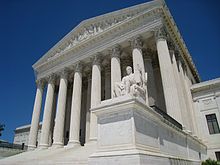“An employer who fires an individual merely for being gay or transgender violates Title VII...”
Supreme Court rules that federal law protects LGBTQ persons from employment discrimination

“An employer who fires an individual merely for being gay or transgender violates Title VII,” wrote Justice Gorsuch in the majority opinion in the case of Bostock v. Clayton County. He was joined by Chief Justice John Roberts along with Justices Kagan, Sotomayor and Ginsburg.
“Today, we must decide whether an employer can fire someone simply for being homosexual or transgender,” wrote Gorsuch. “The answer is clear. An employer who fires an individual for being homosexual or transgender fires that person for traits or actions it would not have questioned in members of a different sex. Sex plays a necessary and undisguisable role in the decision, exactly what Title VII forbids.”
Justice Alito filed a dissent joined by Justice Thomas. Justice Kavanaugh filed a separate dissenting opinion.
The ruling in Bostock covered two other LGBTQ discrimination cases, Altitude Express Inc. v. Zarda and R.G. & G.R. Harris Funeral Homes v. EEOC, each of which involved an employer firing an employee for being gay or transgender.
Clayton County, Georgia, south of Atlanta, fired Gerald Bostock for “unbecoming” conduct after he joined a gay softball league. Altitude Express, a skydiving school on Long Island, New York, fired instructor Donald Zarda after he shared he was gay, and R. G. & G. R. Harris Funeral Homes in Michigan fired Aimee Stephens after Stephens informed her employer she identified as a woman.
These employees sued their employers, claiming sex discrimination under Title VII of the Civil Rights Act of 1964.
Currently, Title VII, a section of the Civil Rights Act, allows religious exemptions for faith-based organizations to hire with an eye to religious qualifications. Some have used this to argue that religious organizations can refuse to hire and/or fire employees who are LGBTQ if it conflicts with their sincerely held religious beliefs.
However, because LGBTQ persons are now included under the “sex” category of Title VII, it is unclear whether these exemptions are still understood to permit religious organizations to discriminate on the basis of LGBTQ status.
“This decision doesn’t change the fact that faith-based employers can prefer people of their same faith, and that may mean they have freedom to not hire LGBTQ people,” said Jennifer Pizer, law and policy director at an LGBTQ civil rights organization called Lambda Legal. “That’s a question we don’t know the answer to.”
Gorsuch’s opinion recognizes the Title VII exception for religious organizations, saying, “We are also deeply concerned with preserving the promise of the free exercise of religion enshrined in our Constitution; that guarantee lies at the heart of our pluralistic society.”
It also said employers can continue to appeal to the Religious Freedom Restoration Act of 1993, which offers broad protections for religious exercise.
In addition, a “ministerial exception” established by the Supreme Court in Hosanna-Tabor Evangelical Lutheran Sch. v. EEOC still stands. That ruling allows religious organizations to select “ministers” — often defined broadly to include non-ordained employees — without regard to protected classes in employment non-discrimination laws.
However, the court is ultimately unclear about how this decision will impact faith communities with traditional views, saying, “But how these doctrines protecting religious liberty interact with Title VII are questions for future cases too … while other employers in other cases may raise free exercise arguments that merit careful consideration, none of the employers before us today represent in this Court that compliance with Title VII will infringe their own religious liberties in any way.”
Francis DeBernardo, executive director of New Ways Ministry, a Catholic group that supports LGBTQ inclusion, released a statement saying that while the ruling “is a reason for all Catholics to celebrate,” he expects U.S. Catholic agencies will continue to “hide behind religious exemptions to discriminate against LGBTQ workers in their employ.”
The Becket Fund for Religious Liberty filed an amicus brief for these cases that was signed by several faith-based organizations including the National Association of Evangelicals, the Church of Jesus Christ of Latter-day Saints, the Jewish Coalition for Religious Liberty and the American Islamic Congress.
The Becket amicus brief said, “Construing ‘sex’ in Title VII to encompass sexual orientation and gender identity, will trigger open conflict with the faith-based employment practices of numerous churches, synagogues, mosques, and other religious institutions, such as religious schools, colleges, and charities.”
Russell Moore, president of the Ethics & Religious Liberty Commission of the Southern Baptist Convention, said in a statement: “The ruling also will have seismic implications for religious liberty, setting off potentially years of lawsuits and court struggles, about what this means, for example, for religious organizations with religious convictions about the meaning of sex and sexuality.”
This article has been updated.
Read more news at XPian News… https://xpian.news




Comments are Closed